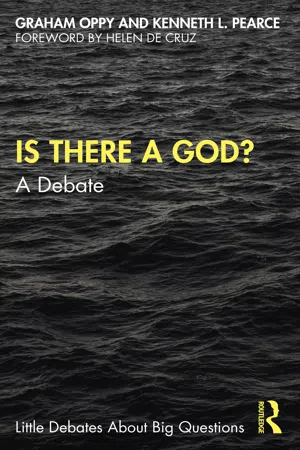
- 366 pages
- English
- ePUB (mobile friendly)
- Available on iOS & Android
About this book
Bertrand Russell famously quipped that he didn't believe in God for the same reason that he didn't believe in a teapot in orbit between the earth and Mars: it is a bizarre assertion for which no evidence can be provided. Is belief in God really like belief in Russell's teapot? Kenneth L. Pearce argues that God is no teapot. God is a real answer to the deepest question of all: why is there something rather than nothing? Graham Oppy argues that we should believe that there are none but natural causal entities with none but natural causal properties—and hence should believe that there are no gods. Beginning from this basic disagreement, the authors proceed to discuss and debate a wide range of philosophical questions, including questions about explanation, necessity, rationality, religious experience, mathematical objects, the foundations of ethics, and the methodology of philosophy. Each author first presents his own side, and then they interact through two rounds of objections and replies.
Pedagogical features include standard form arguments, section summaries, bolded key terms and principles, a glossary, and annotated reading lists. In the volume foreword, Helen De Cruz calls the debate "both edifying and a joy," and sums up what's at stake: "Here you have two carefully formulated positive proposals for worldviews that explain all that is: classical theism, or naturalistic atheism. You can follow along with the authors and deliberate: which one do you find more plausible?"
Though written with beginning students in mind, this debate will be of interest to philosophers at all levels and to anyone who values careful, rational thought about the nature of reality and our place in it.
Frequently asked questions
- Essential is ideal for learners and professionals who enjoy exploring a wide range of subjects. Access the Essential Library with 800,000+ trusted titles and best-sellers across business, personal growth, and the humanities. Includes unlimited reading time and Standard Read Aloud voice.
- Complete: Perfect for advanced learners and researchers needing full, unrestricted access. Unlock 1.4M+ books across hundreds of subjects, including academic and specialized titles. The Complete Plan also includes advanced features like Premium Read Aloud and Research Assistant.
Please note we cannot support devices running on iOS 13 and Android 7 or earlier. Learn more about using the app.
Information
Opening Statements
Chapter 1
Classical Theism
An Exposition and Defense*
Contents
1 Theism Versus Naturalism
A coherent worldview is one whose different pieces fit together neatly.
A tension is a case where a person who holds a certain world-view is pulled in both directions on a certain question.
One worldview is simpler than another to the extent that it posits fewer things, or fewer kinds of things, or is in other respects more elegant and less convoluted.One worldview has greater explanatory comprehensiveness than another to the extent that it explains more things and leaves fewer unexplained.
Table of contents
- Cover
- Half Title
- Series Page
- Title Page
- Copyright Page
- Contents
- Foreword: Worldview Comparison and Religious Commitment
- Opening Statements
- First Round of Replies
- Second Round of Replies
- Further Readings
- Glossary
- Bibliography
- Index